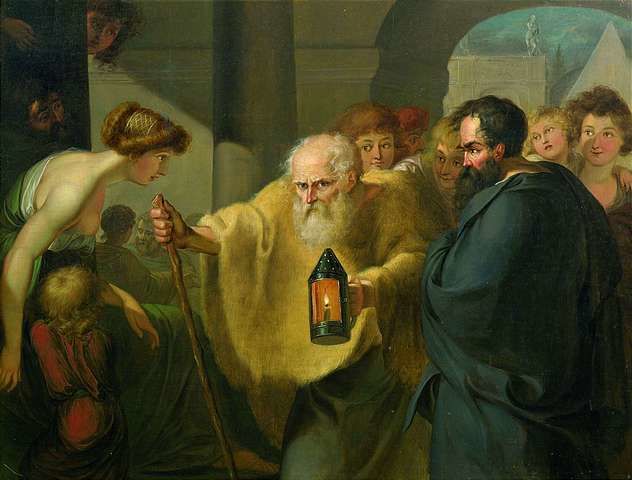A good friend of mine owns an art gallery with a peaceful and immensely satisfying restaurant currently serving lunch.
“I would like you and your wife to have dinner on me,” Frank says. “We’re trying out a new menu. Just tell me what you think of the food and service.”

My first reaction – great a free dinner and all for a few comments. What’s the harm? (You’ve heard this before.) Second thought – wait, isn’t this what Washington lobbyists do for a living?
I know what you’re thinking, “Hold on Kemo Sabe, we’re talking about one dinner in a small town, NOT dinner at Olives in D.C. serving the best beef carpaccio I’ve ever had with Joe Lobbyist leaning in my ear telling me how affordable his health insurance company is for Mr. and Mrs. America.”
“I’d be happy to try the new menu,” I tell him, “but I’ll have to pay for the meal.”
I eat. I pay. I review – everything from the Serrano ham to the chocolate mousse.
Frank calls me Diogenes, the Greek philosopher who walked the streets with a lamp looking for an honest man.
“But I’m not Greek,” I tell him and we laugh.
But what do we really know about Diogenes, beyond his “honest” search?
Diogenes of Sinope was a contemporary of Aristotle and a Cynic.
No, not that kind of cynic.
In ancient Greece, Cynicism was a school of philosophy whose followers believed that the road to happiness was to be found in the simple life… a very simple life… a painfully simple life.
“It is the privilege of the gods to want nothing,” Diogenes said, “and of godlike men to want little.”
Nicknamed “the dog” for his vagrant lifestyle, Diogenes lived in a barrel on the streets of the Greek city-state of Corinth, refused to wear anything but the most basic of clothing and made his living begging. Renowned for his outrageous public stunts, he reportedly masturbated in front of a crowd to show how easy trivial human desires could be satisfied.
(Right about now, I’m rethinking the whole compliment thing, Frank.)
According to Diogenes, mastery of self leads to both happiness and freedom. However, it requires constant practice. It also requires that students release all property, as well as attachments to family and any social conventions that could reinforce “illusory emotional and psychological attachments.”
Okay, so what about the honest-man thing?
According to a heavily footnoted entry in Wikipedia, Diogenes would walk the streets in daylight with a lamp looking, not for an honest man, but “for a human being.”
Unfortunately, the dog “reputedly found nothing but rascals and scoundrels.”
Not the kindest or most patient of philosophers, (Plato referred to him as “a Socrates gone mad”) yet there was method to the great Cynic’s madness. Diogenes believed that if one could detach himself from worldly things, no manner of misfortune could remove the one, real value – mastery of self. “He has the most who is content with the least.”
So, what piece of Cynical advice might Diogenes offer Frank?
Owing to the philosopher’s cranky nature, it might be this: “Dogs and philosophers do the greatest good and get the fewest rewards.”
Class dismissed.
Comments
Leave a Comment










I would be foolish to argue with the author of this blog. He is, after all, a friend and he controls the blog.
I was trying to get people, whose opinion I trust, to try out my new dinner menu. I asked Jim and his beautiful wife to give it a try, “on the house.” I knew him well enough to know that he would give me a frank and honest review. Little did I know!!!
This fellow is so ethical that he would not accept my complimentary offer, but would in fact come to the restaurant and call me later to tell me how it went. I instructed the server to “comp” whatever she could. Jim and his wife dined, had some wine, tried an appetizer, had a dessert, etc. The server offered to “pick up” parts of the dinner or the whole thing. Nothing doing.
A couple of days after they had dinner, Jim called and gave a through and professional review of the evening: environment, service, food and sense of value. He was exacting, as I new he would be. They liked almost everything and had a couple of suggestions for improvement that I appreciated.
Like many restauranteurs, I “comp” food from time to time. No one, not in 17 years has turned down a free meal. Except these two. But to this proud man of ethics, the trade of free food tainted the review. My goodness. I am totally flummuxed. What do you do to say thank you to a guy like that?
So I called him Diogenes. “It was said of Diogenes that throughout his life he ‘searched with a lantern in the daylight for an honest man.’ And though Diogenes apparently did not find an honest man, he had, in the process, “exposed the vanity and selfishness of man.” (Chambers.)”
Jim is so scrupulous that he then researched Diogenes and called to straighten out my foggy school memories about the great cynic. So, I am stuck.
He can’t be comped. He can’t be bought. He can’t be stumped. I give up. The story Diogenes, as it was told to me, was that Diogenes would wander the earth until he found the “one honest man.” Once he had done that, he would blow out his lamp, set it down and enjoy final rest.
I could not be sure, so I called him. Not Jim, I called Diogenes. He was somewhat annoyed by my call. He said not to call again, and that he had retired to Santa Barbara and was laying on the beach getting a tan. He could not recall what he had done with his lamp.
Especially liked This One’s for Frank. Thought I knew about Diogenes and cynicism, but you gave me some new ammo when I tell people I’m cynical. (Of course, if I start masturbating in public, I may have to rethink my stance and/or grip).